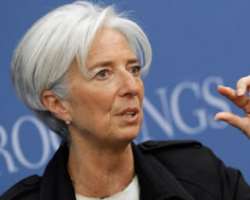IMF tells Nigeria, others to cut fuel subsidies

The Managing Director, International Monetary Fund (IMF), Christine Lagarde, has said African nations especially oil exporters like Nigeria must cut fuel subsidies and curb spending as a slump in crude prices takes its toll on government revenue.
An almost 60 per cent drop in oil prices since June has forced the Central Bank of Nigeria to devalue the naira, raise interest rates to a record and consider shaving the 2015 budget by eight per cent.
President Goodluck Jonathan, who is seeking re-election on February 14, has avoided cutting the $7bn annual fuel subsidy scheme after an attempt to do so in 2012 sparked protests.
Subsidising countries 'should think about reducing and phasing out the oil subsidies, taking advantage of the oil price and using public finance more wisely than in undifferentiated energy subsidies,' Lagarde said in an interview on Wednesday in the Rwandan capital, Kigali.
'For the exporting countries that are clearly taking a hit on both accounts of reduced trade revenues and reduced public revenues, they have to be very cautious with public spending, and reduce what can be reduced and use whatever is left over as buffers.'
According to Reuters, the IMF last week lowered its 2015 economic-growth outlook for the sub-Saharan Africa to 4.9 per cent from a previous estimate of 5.8 percent in October, citing 'shocks' to oil-producing economies from falling prices.
The growth forecast for Nigeria was lowered to 4.8 per cent from 7.3 per cent.
According to Lagarde, Nigeria should re-examine its fiscal and monetary policies immediately after the February elections to see if further action is needed, after the government took steps to rein in spending and adjusted interest rates in November.
The IMF boss said Nigeria had yet to ask for financial assistance from the fund but it would be willing to extend further technical support to the country if requested.
'Shortly after the elections the authorities will have to reassess the situation in view of the continued decline of oil prices to see if more needs to be done,' Lagarde said, adding that 'they may have to take more measures.'
Negotiations with Ghana over a loan programme are continuing in order to resolve 'a few issues' before a proposal can be submitted to the IMF board for approval, she said.
Ghana is seeking as much as $1bn in aid from the lender to help ease a crisis sparked by a depreciation in the currency and soaring public debt.
The government expects to enter the loan programme by the end of February, according to Deputy Finance Minister Cassiel Ato Forson.
In the Ebola-stricken nations of Liberia, Sierra Leone and Guinea, the IMF will probably propose additional support valued at $130m, along with considering debt relief through, at least in part, 're-purposed funding,' she said.
A precautionary credit line for Kenya, East Africa's largest economy, will probably be concluded by next month, said Lagarde.
The IMF said in November it had reached a preliminary agreement with Kenya for a $750m standby loan to help protect the economy against possible market shocks.
